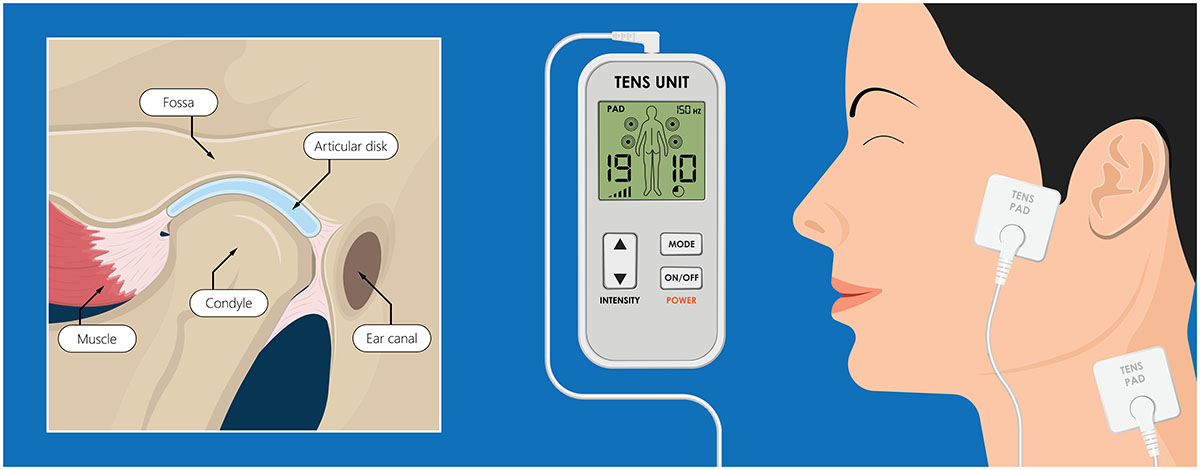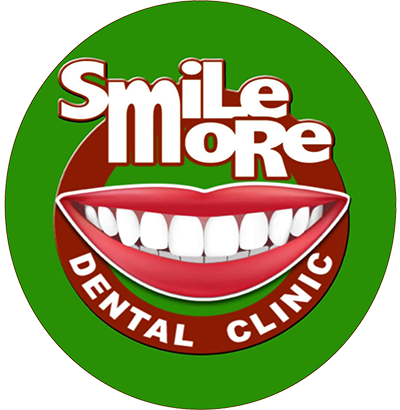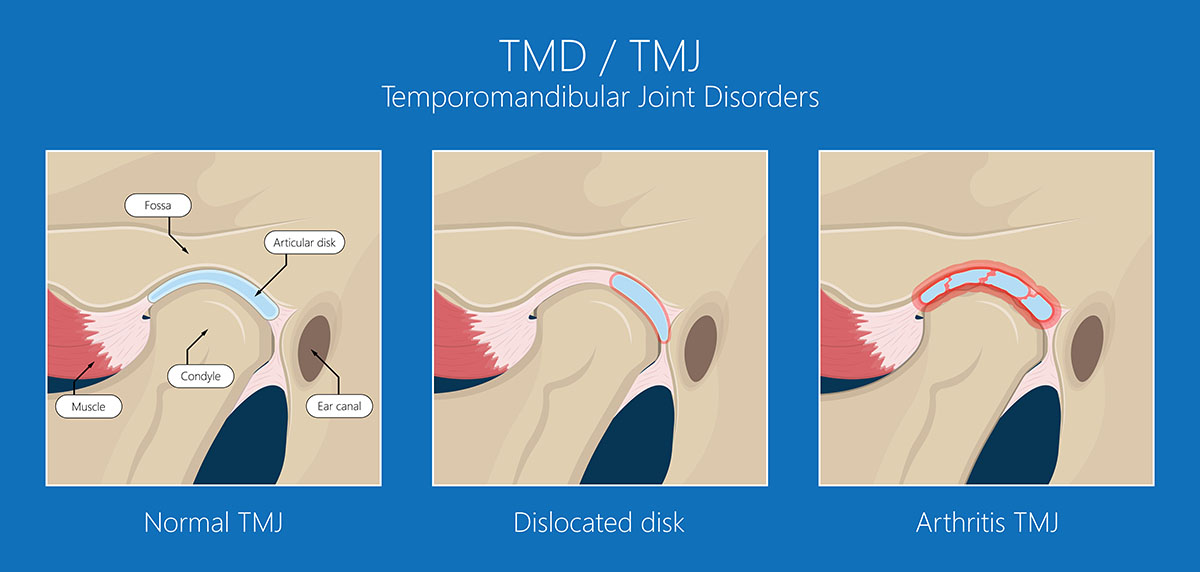Imagine waking up every morning with a jaw so tight it feels like it’s locked. This feeling isn’t just discomfort; it’s a sign of Temporomandibular Joint Disorder (TMD), a persistent condition that can disrupt your daily life.
This guide will examine how TMD impacts your daily life and discuss effective treatment options to restore your comfort and well-being.
The Temporo-Mandibular Joint (TMJ) Explained
We often overlook our jaw’s role in daily life. The TMJ connects the lower jaw to the skull, helping us talk and eat.
Think of it as a hinge near your ear, made up of bones, cartilage, muscles, and ligaments.
This hinge works like the ones on doors, allowing your jaw to open and close smoothly.
When TMJ Harmony Goes Wrong: Temporo-Mandibular Joint Disorder (TMD)
Temporomandibular Joint Disorder (TMD) can cause jaw pain and discomfort. Many don’t realize they have it. What causes TMD? Factors include:
1. Teeth Grinding and Clenching: Bruxism, or nightly grinding, often leads to TMD.
- Stress and Anxiety: These can cause jaw tension, leading to TMD.
- Trauma or Injury: A facial injury can trigger TMD.
- Teeth Alignment Issues: Problems with how teeth fit together can cause jaw issues.
- Missing Back Teeth (molars): Not replacing these teeth can lead to TMD.
Recognizing TMD Symptoms – Warning Signs!
Look out for these TMD signs for early treatment:
- Clicking and Grinding Sounds: When you open your mouth, these noises may mean TMJ issues.
- Lockjaw: If your mouth locks open, TMD might be the cause.
- Limited Mouth Opening: Trouble opening your mouth wide? Could be TMD.
- Jaw Joint and Muscle Pain: Achy jaw muscles or joints? TMD might be to blame.
- Headaches and More: Dizziness, headaches, and earaches can also be due to TMD.
- Sleep Disruptions: TMD can affect your sleep, causing discomfort.
Choosing Relief: The Non-Surgical Approach for TMD Management
Early detection can prevent TMD from getting worse. While surgery is an option for some, many patients find relief through non-surgical means. These options typically involve less risk and a shorter recovery period. For example, fixing jaw alignment can help with TMD.
Some popular non-surgical treatments include physical therapy, oral splints, and medication to reduce inflammation and pain.
A Gentle Approach: At Smile More Dental Clinic, we prioritize a non-invasive approach, offering custom tips for TMJ management. We provide non-surgical ways to fix jaw misalignment. Let’s find the best solution together.
Surgical TMD Treatment: When It’s Necessary
In some cases, surgery becomes a necessity, particularly when the jaw joint is severely affected. Surgical intervention aims to restore proper function but is a substantial step with variable outcomes.
Non-Surgical vs. Surgical: Making the Right Choice
The decision between surgical and non-surgical treatment can be challenging. Our Smile More Dental Clinic team will work with you to weigh the pros and cons, and you will know that the chosen treatment aligns with your specific needs and lifestyle. With non-surgical options, we personalize care to your precise requirements. Our method gradually addresses symptoms and root causes, avoiding invasive procedures and prolonged recovery times.

Your Path to Lasting Comfort: Non-Surgical TMD Treatment
Curious about non-surgical treatment? Here’s how it works:
- Evaluation: We check your oral health and teeth for TMD signs.
- Diagnostic Tests: We will request TMJ X-rays and panoramic X-rays and create models and photos of your jaw to understand your condition thoroughly.
- Therapeutic Care: Transcutaneous Electrical Nerve Stimulation (TENS) for pain relief, as required. TENS therapy uses mild and easing electrical pulses to help relieve pain and improve TMJ function.
- Custom Appliance: A tailor-made TMJ Splint moves your jaw to a better spot, stopping teeth grinding.
Sustainable Comfort: Avoid post-op issues. Enjoy better jaw function and comfort.
TMJ Treatment Cost – How Much Should You Pay?
Understanding TMJ treatment costs is like starting a personal journey. Each person’s story is different because jaw problems grow slowly. These might come from not fixing missing teeth or having teeth that don’t line up right. When you start feeling jaw pain, it’s essential to take action.
When considering the cost of TMJ treatment, remember it’s not just about spending money. It’s about feeling better and staying healthy for a long time. If you wait too long to get help, your jaw might hurt more and cause bigger problems. Spending money on your jaw problem now is like helping yourself avoid constant headaches and pain. It’s super important to think about how much better you will feel, not just how much it will cost. Feeling good and not having pain is worth it.
An excellent first step is to see a dentist. This move shows you’re serious about getting better and improving your health. You might think about needing tests or a dentist’s opinion. Here’s the deal: that’s a brilliant idea. Finding out the exact issue with your TMJ helps a lot. Dentists must see you to know what’s happening; they can’t guess over the phone. So, a dental check-up is the best way to understand your TMJ problem and get the proper treatment.
Reclaiming Comfort:
Ready to take a step towards a pain-free life? Contact Smile More Dental Clinic for expert help with your TMJ problem. Our dedicated team is here to guide you towards comfort and health. For more information or to schedule an appointment, you can reach us at (+632) 8 6429761 (Landline) or message +63905-3350118 (Cell. No. / Viber). Let us help you smile with comfort again!


